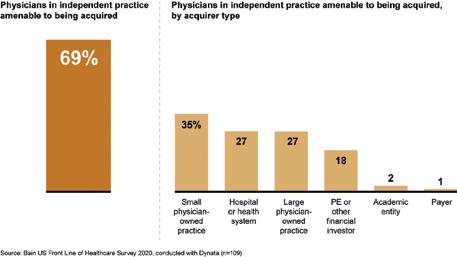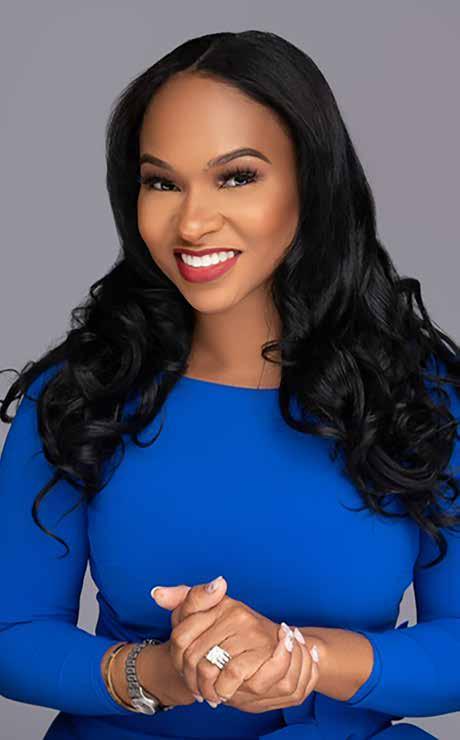
39 minute read
you might be missing
from EGP March April 21
Company Culture
5 core areas of culture you might be missing
By Sarah Ruberg
In work society today, people are putting much more value in a com-
pany’s culture than ever before. This is seen during interviewing, where almost all of our interviewees ask, “What is your company culture like?” Individuals are looking for a place where they feel a sense of belonging and are willing to make compromises for it. Some are willing to take a reduction in salary if they feel as though they’ve found a company with a good culture that they want to grow with.
Beyond hiring, having a strong company culture can play a large part in reducing team turnover, boosting morale, improving workplace productivity and creating a positive and healthy working environment! At SMC, we’ve identified five core areas of culture to focus on that will help your team tremendously.
Take your shoes off
In the group practice space, a common challenge is merging a new acquisition’s culture into your own. To make this easier, think of culture like a fine china shop. Be respectful, take off your shoes, and maneuver carefully and sensitively as you don’t want to break anything. Sure, you can move things around, but make sure to wear gloves so you don’t leave any damaging marks.
Discover your “Why”
Establish who you are, what you stand for, your purpose, and your “Why.” Lack of a clear foundation will result in a company taking on the culture of its people rather than the people taking on the culture of the company. When you identify a strong foundation, you will attract the kind of people who fit with your culture and exemplify your core values.
Find unicorns
At SMC, we refer to these ideal culture fit individuals as “unicorns” and the team loves it! Defining this culture and the individuals makes it more real and fun for everyone, so sprinkle it in! Incorporate it into your day-to-day and even into your recruiting and onboarding systems. Make sure that job postings and interview style reflect your culture and it will be sure to be a big hit.
Show, don’t tell
Most importantly, culture comes from the top down. Even if you have the “sparkliest” and most “unicornesque” person on your team acting as a Culture Ambassador, if the
higher ups don’t feel the same, it will show and be hard for the team to adapt. Explain to new team members that culture isn’t just lip service, it is adapted on all levels of the company and that the growth of your team is a top priority.
Ask “what’s for dinner?”
Team one-on-ones aren’t something new, but they are POWERFUL when conducted regularly and correctly. Many times these meetings end up being conversations about strategy when they should really be about connecting with your team. With a properly conducted one-on-one, you can protect your company culture and keep a pulse on the happiness of your team just by asking questions totally unrelated to work! When you ask about the personal, professional, and financial goals and interests, people tend to open up more. Not only will team members open up about their life, but they will also open up more about work, giving you an insight you wouldn’t have seen otherwise.
Sarah Ruberg
SMC’s Culture Ambassador is all about helping her team of Unicorns grow and develop, both personally and professionally. Through unique and innovative team building ideas, she has increased overall satisfaction company-wide and created a thriving culture for SMC. Her passions include raising house plants, an (un)healthy obsession for Simon Sinek, and sending Looms of her singing when nobody really asked for them.
your vision powerfully, seamlessly, immediately
The iTero Element 5D Plus Series (excluding the iTero Element 5D Plus Lite configurations) requires the use of a full barrier sleeve and clip on vent cover for the United States.
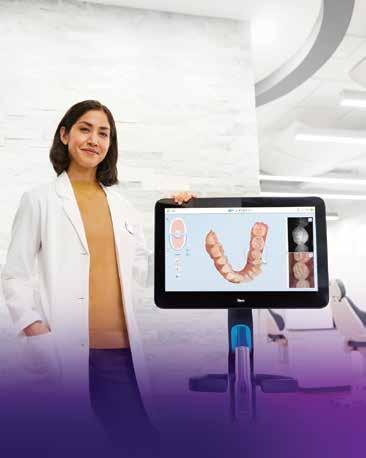
© 2021 Align Technology, Inc. All Rights Reserved. Invisalign, iTero, iTero Element, the iTero logo, among others, are trademarks and/or service marks of Align Technology, Inc. or one of its subsidiaries or affiliated companies and may be registered in the U.S. and/or other countries. | MKT-0005623
New
Stronger capabilities. Greater productivity.
The iTero Element® 5D Plus imaging system in cart configuration brings:
• Reimagined visualization • Powerful new capabilities • 3D models, intraoral images, and aids in caries detection—all in one scan to maximize the productivity of your digital workflow
Schedule a demo today and learn more at iTero.com
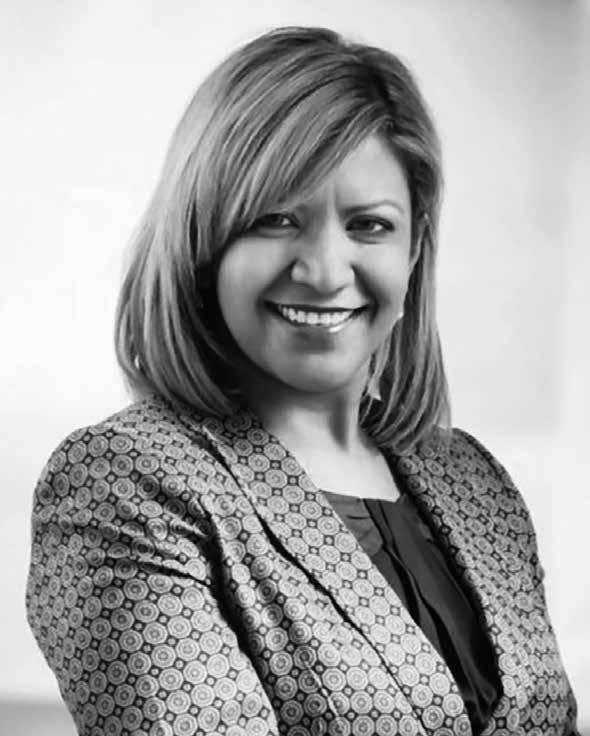





Women Leaders in Dentistry
Welcome to Efficiency in Group
Practice’s celebration of Women Entrepreneurs and Executives in Group Dentistry. These leaders come from across the United States and Canada with different backgrounds and serve different roles in the dental space. We hope you enjoy reading about their leadership experiences, lessons and hopes for the future.
Executive of a DSO

Aman Kaur, DDS
CEO AiM Dental Alliance Kansas City, Mo.
Dr. Kaur is the CEO of AiM Dental Alliance and has added over 20 practices in the past year. With 18 years of experience in the dental industry, she has worked with multiple DSOs over her career in various executive roles and is a board member of DSOs, government dental programs and dental product companies.
EGP: Who do you look up to for inspiration or mentorship?
Kaur: There are so many people who have inspired me throughout my career at various stages in my life. My parents and my dean from my business school are my sounding board and have kept me in the right frame of mind throughout my career. I have been very fortunate to be a part of some great teams throughout my career; their drive to grow and excel has been my true inspiration. I have always believed that I work for my teams and not the other way around. I am also a member of a small community of women executives across different industries. We collaborate on a regular basis to learn more about various business areas, as well as continually grow as leaders.
EGP: How do you keep your team motivated despite conflicts and obstacles?
Kaur: We need resistance to move forward. Running into obstacles is a sign that you are not staying still but going places. Everyone has different work styles, strengths and preferences; conflicts are bound to happen, especially in growing organizations in a rapidly changing industry like ours. We have a great team of leaders who are comfortable with conflicts and see obstacles as a challenge and reason to change and improve. There are times things do get hard and teams lose motivation to give their best. But teams generally take on the mood and feelings of their leaders, and with leaders being comfortable with conflicts this helps team members speak their mind and have open and meaningful conversations that ultimately keep us all motivated. Being able to talk to your manager honestly, feeling heard, and knowing you all are rowing in the same direction is something everyone deserves.
EGP: What qualities are lacking among today’s leaders?
Kaur: I am a personal fan of the thoughtfulness and ability to give back that I have seen in today’s leaders at all levels. As we all grow in our roles, we learn the importance of permanence, perseverance and persistence despite obstacles and lack of encouragement. Once they go through such experiences and form these qualities that can help leaders grow to even greater heights.
EGP: What are your current goals?
Kaur: We have been consistently meeting our growth goals and want to keep up with these growth goals for our organization to add more locations, as well as further growing our services portfolio. However, I am most excited about working with some great DSO industry veterans in the WomenInDSO organization that we have started together. It is amazing to see so many talented women doing the lion share of work in various large DSOs over several years. With WomenInDSO, we will be creating a formal mentorship program for future women leaders to continually grow and shape this industry.
Executive of a DSO
Maryam Beyramian
CEO Westwind Integrated Health Phoenix, Ariz.
Dr. Beyramian started Westwind Dental Group in 2002. Primary care medicine was added to its service offerings in 2017 and the group was rebranded to Westwind Integrated Health. Today, it consists of nine practices and more than 20 associate doctors throughout the Phoenix area. Westwind Integrated Health is a service-oriented group providing comprehensive integrative oral and systemic care to patients of all ages.
EGP: What did you learn about yourself and your team amid the pandemic?
Beyramian: When the pandemic really started to take a serious turn, we were in the Houston airport just returning from our family vacation in Belize. We arrived at an airport filled with people staring at a news conference with Donald Trump announcing that he would be closing the borders on Friday. It was Wednesday. I looked at Nabil, my husband, and thought, “wow, is this real?” Are we going to go down this road again? I’m not sure if you know, I am Persian and was born in Tehran, Iran, just before the revolution. By the time I was three years old the war had begun in our once peaceful and prosperous country and for the next eight years we lived through war and chaos. The start of the pandemic reminded me of our earlier life where chaos management was the norm. In the coming days, as we listened to our friends in other states shut down their offices, we braced for a full shutdown.
Crisis management and survival was the only thought on my mind. We had over 80 team members and 20 doctors that may possibly be without a job and income. This weighed heavily on my heart. In the next month and a half, we closed six of nine offices and filled the remaining three to capacity. We just put our heads down and worked. We cleared our AR processes and improved the workflow around billing. We set up a call center, brought in all the office managers and treatment coordinators that needed to work, but had no office to work in, and set them up to take calls and start training a new call center team from scratch. We renovated our closed locations – something we had been putting off for a while. We worked and worked – six days a week seeing patients until the country opened back up and a new norm was established. I learned a lot about myself and my team during the pandemic. We are a resilient bunch!

EGP: What skills will be needed for dental group practice leaders to succeed in the next five to 10 years?
Beyramian: Owning a group practice as a dentist and practitioner has its unique challenges. I chose a career in dentistry because I truly believe that the creation of a beautiful and healthy smile for a patient improves their emotional, mental and physical well-being. We created our group practice to focus on just that, improving our patient’s overall health. We want our patients to walk out of our offices emotionally and physically healthier than they walk in.
Group practice is the future of our profession. The level of collaboration, support and growth opportunities you receive as a practitioner in a group setting is unparalleled. As a group practice leader, I believe that vision for patient care needs to be very clear so that it can be communicated to all levels and all team members in the organization. For example, our group focuses on the delivery of whole-body wellness to our patients. If all our touchpoints are focused on this mission, then our care is consistent across all levels and all offices.
I believe that care alignment is the foundation for creating a strong base for a group practice. Once your group grows past four or five locations, unless you have a clearly communicated care model, your offices will get fragmented into subcultures. I guess my advice for a practitioner looking to expand their practice into a multi-location group is to look and see what you believe in. Look at your care philosophy and develop your systems and processes around that vision.
EGP: What resources, programs, etc., have you found effective for personal development?
Beyramian: Personal development for me started about 13 years ago after we sold our first dental group. By 2008, I had been in practice for seven years, we had built 11 offices from scratch – four from other corporations, and six were ours which we sold in earlier in that year. By March, we had kept one remaining office, which was our flagship location, and I had hit a wall.
I had planned out so much of my career and personal life up to that point. At the time, my mind was solely focused on graduating dental school, opening a group practice and nothing more. Once I had achieved this goal, I did not know where else to take this vision and my future. I needed direction and I needed to take some time off, reprioritize and build clarity. I spent the next eight years practicing dentistry part time, spending lots of time with my young children, and finishing my MBA, which was a lifelong dream of mine.
During my MBA program, I attended many leadership and personal development courses. I spent many days and weekends in courses, meditations and vision sessions, and retreats with leadership coaches. Finally, I slowly began developing a new purpose, a vision of how my strengths and skillset can translate to the betterment of my community. By 2016, we began to transition our practices to a model of whole-body wellness care with a mission to identify and fill patient’s care gaps. When we started down this model of care, we were unique in the dental industry and were afraid to share our model for many would judge that we were reaching too far into medicine. Dental group practice was controversial enough at the time. Imagine talking about a dental group that was trying to incorporate primary care medicine!
We searched for resources and organizations that would understand our vision and encourage our path and we found the DEO. The DEO is a mastermind group for dental group owners who are looking to collaborate and grow. We joined them to help us in the process of developing and clarifying our group’s vision and goals to align with our personal goals and mission to serve. Throughout the years with the DEO, we have grown both personally and professionally. We have developed lifelong friendships and found mentors. I sometimes feel that we are all a group of misfit children that play together, laugh together and encourage each other no matter how far our nutty ideas take us!

Executive of a DSO

Maja Martin, DDS
Co-Owner and Chief Dental Officer Village Dental Raleigh, N.C.
EGP: How do you align your organization with your vision and mission?
Martin: We are building a legacy model dental group where everyone can be their best self by changing the way people feel about dentistry. Our 10-year target is to become a nationally recognized “Best Places to Work” organization with six convenient sedation locations helping 250 team members be their best self.
EGP: What are the most important traits before promoting?
Martin: The trait I look for the most when hiring doctors is how humble they are. My favorite quote is “If you are not willing to learn no one can help you. If you are determined to learn no one can stop you.”
Dr. Martin is the co-owner – with her husband Chris – and chief dental officer of Village Dental, a group dental practice with a focus on sedation dentistry. There are four locations and about 120 team members. She came to the United States as part of a student exchange program in 1991 and stayed to play basketball at the University of North Carolina (UNC) from 1992 to 1996. She is a 2002 graduate of the UNC Adams School of Dentistry and a member of 1994 University of North Carolina Women’s National Championship Basketball team.
EGP: When building up your group practice, how do you create alignment in your culture where everybody is under the same brand?
Martin: It’s interesting, we’re going through some major cultural shifts in our practice right now because until recently, we were sort of running parallel to each other with our two practices. We had two really large practices that we ran separately. And now we’re trying to combine it into one brand and make things uniform across all the locations.
It’s definitely a shift we’re going through and it’s a super important aspect of our growth right now. This is going to make a huge difference in what we can do going forward.
We joined the EOS (Entrepreneurial Operating System), which has been important in defining all of our business components, and communicating the message down to the whole team. We’re working through the process and going through some growing pains, but we’re seeing the benefit of it already.
Our why and core values; never stop learning, whatever it takes, own it, solve it, embrace change, be kind and have fun, are written and posted in all of our offices and our level 10 meetings are happening at the executive, operative and other levels.
EGP: Who do you look up to for inspiration or mentorship?
Martin: I love practicing dentistry. My Kolbe is 7-7-2-5, which makes me ideally suited for the detail-oriented, precise nature of dentistry. When it comes to being a co-owner, leader and manager of a group dental practice, things are a little more challenging. I am still very much a beginner in this area and spend many hours reading and learning from other great dental leaders. My favorite books so far are: “The Carolina Way,” “Radical Candor” and “Ask Powerful Questions.” The DEO has been a great resource for business development and leadership role models. If I had to summarize my leadership style, I would say I lead by example.
Executive of a DSO

Ellen Polsky, DDS
Owner Kid’s Choice Dental Puyallup, Wash.
Dr. Polsky is a pediatric dentist, serial entrepreneur, innovator and technologist. She runs a multiple-location pediatric and orthodontic practice focused with a data-driven approach in clinical dentistry. She serves on the board of MultiCare Cascade Outpatient Surgery Center and recently joined the advisory board for tab32, an enterprise, cloudbased dental software company.
EGP: What’s the most important risk you took and why?
Polsky: Admittedly my perception of risk is a bit different than most as I believe the greatest risk is missing a good opportunity because the fear of failure is too great. Having previously survived failure has proven to be a valuable lesson.
My most important risk was to build a medical and dental surgical center in an area where three large hospitals were denied the permit to establish a lower-cost care level facility. I was trying to solve the problem of patients’ high out-of-pocket expenses and high-wait times caused by low operating room capacity in the area. We bet on being able to maneuver in the space much faster than local hospitals while at the same time seeing the hospital’s need for a low-cost operating center. By building a surgery center, then partnering with the local hospital we were able to lower patients’ medical out-ofpocket costs by 300% and decrease waiting times. Today, the surgery center performs over 5,000 orthopedic surgery procedures, ENT, oral surgeries and pediatric dental surgeries per year. The importance of this project was its profound impact in the health care access of the community and a validation that our insights into the health care market were correct.
EGP: What are your current goals?
Polsky: I am an admirer of Mark Cuban who is noted for saying “The best way to predict the future is to invent it.” The health care landscape is rapidly changing as the consumer demands cheaper, faster and better care. Our multiple practices strive not only to implement best practices but also to be on the forefront of developing novel tools that improve outcomes and lower cost.
We are currently adopting AI and computer-guided technologies in our orthodontic practice as well as building the digital infrastructure to track clinical outcomes. We plan to leverage tab32 PMS’s Big Query data warehouse mining capabilities to gain business and clinical insights for efficient data-driven decisions. Further, we are partnering with tab32 to create a digital platform that will engage providers to collaborate and share their clinical experiences; and develop decision support algorithms to ensure a higher standard of care.
EGP: How do you align your organization with your vision and mission?
Polsky: Meticulously defining the vision of the company and the execution plan is essential and allowing for flexibility, as things never seem to go exactly as planned.
This leads to the second point. Don’t try to control everything. This did not come naturally to me as my pediatric dentist training taught me to take personal responsibility and control of everything. I learned the hard way that in the business environment this approach doesn’t work. Aligning the organization’s goals with employees’ personal goals starts by having an active, ongoing discussion with them. Giving them a personal stake in the company they work for makes them the best advocates for the product and the mission. It took us years to create this culture.
EGP: What are the most important attributes of successful leaders today?
Polsky: A successful leader creates robust systems and a culture that empowers employees in the organization so there is less reliance on the leader to make all the decisions and push the organization forward.
Executive of a DSO

Shawn Wherry
VP of Marketing Dental Care Alliance
Wherry has overseen all aspects of marketing at Dental Care Alliance (DCA) since 2006. DCA is one of the largest, multi-branded dental support organizations with 330 allied practices, including all specialties. DCA supports more than 750 doctors in 20 states.
EGP: What are the most important attributes of successful leaders today?
Wherry: I think 2020 certainly showed that adaptability is a key attribute for leadership and business success. Being able to capitalize on and thrive in all economic climates is extremely important for leaders to be effective today. Nothing is static, especially in marketing. Identifying opportunities and being able to execute strategic solutions quickly is essential. The execution component is often the most difficult. In my experience, there’s no shortage of marketing ideas and opportunities, but a leader’s ability to prioritize and execute is where they can differentiate themselves – and that ability is made possible by the team that surrounds them. Unleashing the talents and strengths of others around you is great leadership.
EGP: How do you keep your team motivated despite conflicts and obstacles?
Wherry: Working in marketing can be challenging, but that is what makes it exciting and fulfilling. Marketing can be an easy scapegoat for poor performance, and oftentimes not the hero when business performance is positive. Data is our greatest tool and asset. When conflicts or obstacles arise, I keep my team focused on our overall objectives and stress the importance of clear, proactive communication using our data analysis to educate and inform. We celebrate wins and learn from losses. The learning never stops, and there is always opportunity for growth and improvement. Striking a balance between autonomy and teamwork is important. I strive to lead by example while also giving my team the freedom and opportunity to carve their own roadways to success.
EGP: What are the most important traits to look for when hiring a new employee?
Wherry: Critical thinking skills are the number one attribute I look for in employees. Being able to assess a situation accurately and take appropriate action is essential in marketing. Communication skills are high on the list too. So much of our role as marketers centers around communication, so the ability to effectively communicate with all audiences in all formats is extremely important. Flexibility and self-motivation are other key traits. With DCA’s multibranded structure and diverse mix of practices, we must be able to work seamlessly together at a fast clip and pivot quickly to anticipate and respond to changing business needs. Choosing employees with these traits who also align with our company and team culture is a great recipe for a strong, highly effective marketing team in my opinion.
Executive of a DSO

Heidi Arndt
CEO Strive Dental Management Austin, Texas
Arndt has served the DSO space for more than 18 years. She is dedicated to supporting clinicians and management teams to meet their full potential. She has served as CEO and chief operating officer of Strive Dental Management since 2019. Previously, Arndt was the founder and CEO of Enhanced Hygiene, dedicated to helping dental groups create an engaged and profitable dental hygiene team.
EGP: What’s the most important risk you took and why?
Arndt: The most challenging and vital risk I ever took was selling my consulting business after founding it and growing it for eight years. My consulting company was like a child to me. This move was by far the most challenging and eventually rewarding risk and shift I ever made.
While I am a trained and licensed dental hygienist, my passion was to continue growing within the dental community, specifically within the DSO community. I wanted to reposition myself away from only being seen as a clinician. My goal was to move into an executive position where I could use my clinical and business knowledge to support an organization's growth. This shift in my career was difficult, but it led me to be the CEO of a mid-size dental group. I have grown leaps and bounds and am excited about what the future has to hold. being a leader. You must be willing to fail and learn from it. Learning how to fail forward has taken me years to do, but my most valuable learning lessons have come this way. I had to move from perfect to getting uncomfortable, taking risks and accepting failure, which was the hardest one.
As a leader, I need to create an environment where failing forward is accepted and embraced as part of a learning culture that seeks continuous improvement. For my teams and me, that improvement includes actively learning from our individual and collective mistakes.
EGP: How do you generate great ideas in your organization?
Arndt: Collaboration. As the CEO, I do not have all the answers. My goal is to create an environment where the entire team can share ideas – not just the leadership team but also the organization. Some of our most
EGP: How do you continue to grow and develop as a leader?
Arndt: Learning and growing personally and professionally is essential to me. I am an avid reader and podcast listener. However, my greatest lessons have come from the hard knocks of significant advancements have come from all corners of our organization. Once you align your team around your goals, the ideas start to flow. Clear mission, clear vision and clear objectives have guided our team to perform at a high level.
Leader Serving DSOs
Jodi Evans
Founder and CEO RevOps Dallas, Texas
Evans has worked in the dental industry for nearly 10 years and helped build Community Dental Partners from five locations to 50 and more. She has served as a chief marketing officer and chief operations officer. Most recently, she is the founder and CEO of RevOps.
EGP: How do you keep your teams motivated despite conflicts and obstacles?
Evans: This is an amazing question. I'll use an example of when conflict could arise in trying to achieve a goal. When there were obstacles and conflict, I would always go back to my alignment anchors: 1) our mission as a team, 2) the ultimate results that the company is committed to and 3) our culture.
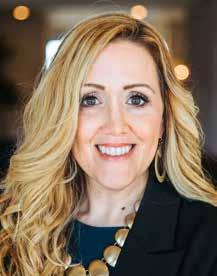
1. Our Mission: Serve the underserved market 2. Core Results: Provide an amazing doctor, staff and patient experience 3. Our Culture: The 9 pillars
Everyone in the room was aligned on these three items, so we automatically had common ground we agreed on. Then, I move to the “what’s.” What are the strategies to achieve the mission and results? And every “what” had an assigned leader. For our teams, we developed an annual playbook that told us what we were going to do and who was leading that “what.”
During COVID, that playbook changed dramatically. So, we adjusted and rebuilt our playbook for the period we could see (for one day or one week, for example). What are we going to do? Getting aligned on what created the needed discussion for us to work out any misalignment and then assign the right leader to implement the strategy.
Then you have the “how.” For me, the “how” is entirely up to the people in charge of the “what.” Empower them to do it their way. Appoint a lead and let them lead. If you have your anchors, the “how” is flexible. We had systems to guide them and ensure they collaborated with all departments, but ultimately, it’s the leaders in charge of “what” that drives the “how.”
Lastly, we measure the results and more importantly, celebrate the results. Don’t take wins for granted. Wins unify the team and
get them back to the three alignment anchors of 1) mission, 2) ultimate results and 3) culture. That’s how we created unity and kept the team engaged.
EGP: What is the most important attribute of leaders today?
Evans: What I think great leaders need more than anything is the ability to see themselves from a data standpoint. I needed a systematized way to get feedback that told me how I show up, how I solve problems, where I contribute and where I get in the way. That level of continual
awareness allowed me to make it safe for my teams to see the same things in themselves.
Leaders must be the most vulnerable and always go first in this area. Intuition wasn’t working for me, so I created what I call baseball cards, along with team summits to help us embrace this more. The power is that I was able to hire great people who thought and behaved differently than me, and then empower them to get the best results. Strong leaders could be threatened by the fact that their team is smarter than them in multiple areas or leads better than they do in many ways. But if you want to lead leaders, you must make a clear space for them.
EGP: What’s the most dangerous trait a leader can have in their career?
Evans: Unspoken insecurity. I was assigned to collaborate with a new team, and I felt very inadequate. I wasn’t sure how to navigate the new role. I found myself saying “yes” to things that were so outside my wheelhouse, and I was trying to hold it together. In fear of being seen as inadequate, I tried to leverage my team. Then one day, I knew it was time to increase transparency. I wrote to my boss and said “I love your vision and where you are going. Here is where I think I can help and here is where I do not have the skills and I’m struggling to support, etc.”
I came up with some solutions of team members who had those strengths as we worked through how to get the results we needed. It worked so well that I took the same framework to my direct reports and they were able to share where they were confident and where they were struggling. It drove so much clarity, team collaboration and support. We improved morale and collaboration, and we helped everyone get in the right lane to get the best results.
Three books I recommend: 1. “Tribal “Leadership” 2. “Who Not How” 3. “The One Thing”
– Author Unknown
Telling your story through ads in Efficiency in Group Practice to over 12,000 + within the corporate dental sector that will help keep you top of mind in any economy.
Who is telling your story?
FOR MORE INFORMATION CONTACT: AMY COCHRAN • 770-263-5279

Leader Serving DSOs

Dee Fischer
CEO Fischer’s Professional Group Orlando, Fla.
Fischer has decades of experience growing DSOs, helping doctors create systems, accountability and passion in the workplace. She has been an integral part of several DSOs’ exponential growth, guiding the operations and HR management to scale to larger organizations.
EGP: What is one decision you wish you did not make?
Fischer: The one thing I would have done different is to remain with my design-build company that I created. I left when it was in full swing. The model that I created was unique and worked well. Many doctors that were part of this program have flourished beyond expectations. I learned that it is extremely important to lay out ground rules as to what each partner will be accountable for. My error in the long run was to never assume the long-term outcome. make, a direction with a knowledge base as to where to go and how to find what is needed, and a timeline to implement systems for scaling.
EGP: How do you generate great ideas in your organization?
Fischer: All are empowered to grow. They must learn something new every day and put it in use and to be discussed at leadership meetings so it can be delivered to all team members. There was never a slip up on this. It was done every day by each employee. It made them realize
they were learning new things every day. Whether it was from a patient or a coworker. It is the skill set of listening to learn something new every day. Imagine 100 employees’ input: an amazing outcome!
EGP: What are the most important traits before promoting?
Fischer: First and foremost, humility is a must. Second, work ethic. Next, can they still grow in the position we are putting them into? Finally, can they see their career path?
EGP: What one thing makes you most proud?
Fischer: Easy one here: Having a group of dentists and team saying, “I would have never been able to do this without your guidance.” This is always music to my ears. I feel they would have been successful, however, populating them early on with knowledge of mistakes not to
Leader Serving DSOs
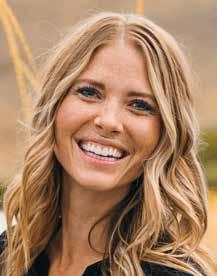
Kiera Dent
CEO Dental A-Team Reno, Nev.
Dent is the CEO of Dental A-Team. She believes running a practice should not be hard, having accountability can be easy and getting home on time is your reality. Her passion is helping dentists and teams expand what they believe is possible in business and themselves.
EGP: What qualities are lacking among today’s leaders?
Dent: Today’s leaders are often forgetting foresight, agility and the ability to innovate while being compassionate and truly leading. As leaders, we are the examples, the people who set the tone for society and it’s our moral obligation to show up, play full out and truly lead people to being their best selves. I feel we have sometimes become hardened instead of being there to truly lead. Be the example. I believe to be the best, we must be competing against our best and looking for the next version instead of blaming and finding the excuses. Seeing the economy, COVID, housing or any other problem as “flavors of business” instead of something to blame is where leadership shines. This is business. This is where leaders get to stand up and shine. They get to take ownership and dominate no matter the circumstances. I think if more leaders were like this, we would have a different society, stronger businesses and stronger teams. The great news: This is an opportunity for leaders to show up and make strong movements for change now.
EGP: What’s the most important risk you took and why?
Dent: Literally starting The Dental A-Team! I knew I always wanted to own a business. It called to me and I could feel that yearning in my soul. I couldn’t satisfy it and it would never go away. I grew up very religious and the thought of being a working female was never something I had entertained. However, business called me. I have a passion for growing, building and creating. Businesses are my creative playground to make all my crazy ideas become a reality.
Starting the business was terrifying. What if I failed? What if this was just some silly idea? I literally jumped without looking to see if the parachute was attached and followed the inner knowing that this is where I should be. I would tell all entrepreneurs to jump! Follow that inner knowing and move. Move quickly. You are the only thing holding you back. It won’t always be smooth sailing, but it will be the freedom and creativity your soul is begging for! It is truly still a scary ride but loving the journey.
EGP: How do you continue to grow and develop as a leader?
Dent: I invest in myself every year. I look to see where we are weak as a company and where I am weak as a leader and I look to find the best people to teach me. I’ve attended Tony Robbins since I think he is the greatest when it comes to consulting and events, which is the area we are in. I love Donald Miller for marketing and Rachel Hollis has been a great mentor. Connecting with authors of books that have transformed me – Mike Paton from the EOS crew, Mike Michalowicz from Profit First. I am forever the student and always looking for coaches, consulting, and people who are experts in their industry who can mentor me, or I can get closer to and continue to learn from. They say repetition is the mother of skill.
I also read at least one book a month. I love Audible and find there
is more gold from the minds of men and women than anywhere else. Invest in you. Take time. Become a master scholar in the areas you are weak. Snag a mentor. Hire a coach. I do a lot of coaching with experts because I believe proximity is power.
EGP: How do you align your organization with your vision and mission?
Dent: We operate our company from the “Traction: Get a Grip of Your Business,” EOS model. Every quarter we run a quarterly meeting and align the entire company. We review the mission, vision, core values and company goals and ensure we are all bought in and committed and change them as needed. It’s a collaborative process and I believe the team has brilliant ideas that can make the company even better.
Every week we run a meeting and review our mission statement, vision statement, core values and our goals for the quarter. We ask for feedback from our team and integrate their ideas. We are constantly analyzing and creating a better company. I believe having a leader who knows the big vision and having a team create the way of how to get there creates buy in, connection and unity to achieve goals together.
We also have monthly check-ins with each team member and assess how they are living our company core values, mission and vision of the company. We live by our core values and standards of our company and make sure they are integrated into all the areas of our company. It’s amazing when you see the team literally living your core values and mission statement in their daily lives. That’s when you know they are bought in completely!
Leader Serving DSOs
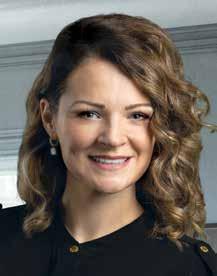
Grace Rizza
Founder and CEO Identity Dental Marketing Chicago, Ill.
Rizza is the founder and CEO of Identity Dental Marketing, which serves dentists nationwide with ethical, effective marketing solutions. It has helped to propel more than 1,500 businesses to more success. Rizza has authored industry-specific articles, podcasts and blogs since launching Identity Dental Marketing in 2009 and spoken at dozens of dental meetings.
EGP: How do you keep your team motivated despite conflicts and obstacles?
Rizza: Recruiting the right team and leading them with enthusiasm is one of the three most crucial elements to the success of a business. The others involve organized processes and the quality of your product or solution. I have a few unconventional ways of keeping my team motivated and excited, even in the most challenging times.
Consistency is crucial. Team members will leave an organization (or a leader) who isn’t consistent in the expectations, involvement and positivity. Employees love to know exactly what is expected of them. By utilizing a platform that allows for clarity in task delegation, quality control and communication, we can be confident that each team member knows exactly what’s expected every day and is held accountable for their individual contribution.
Beyond clarity in expectations, it’s important to be consistent with your involvement. I love our weekly Monday morning meetings. It allows us to connect, talk through learning experiences from the previous week, introduce new clients, discuss process changes that will improve our service to clients and so much more. My team knows exactly when to run new ideas by me, how to request for time off, how to handle a deadline extension request, how and when to get approval on a design or a written project. By showing up every day and sticking to my commitments to my team, they in turn do the same.
Consistent positivity is the most challenging in my opinion. Being an “open book” is great, until you have a bad day or face a conversation that requires a great deal of patience and compassion. Being a fast-paced decision maker is great if you know how to slow down when it’s required. During the COVID shutdown, like many other business owners, I had many tough decisions to make very quickly. Early on I came up with a plan. I estimated the length of a potential shutdown (and was correct almost to the day). I came up with a payment deferment plan for my clients, assured all my team members that I would not be laying anyone off and would personally fund any damages to the business for at least two months and then we would reconvene.
I led my team with positivity and confidence, despite not knowing when our clients would be allowed to reopen or ready to invest in marketing. I coached my team on compassionate conversations, I donated free services, and even started a daily positivity text and group to help those who
were struggling to stay positive. At one point, I had to step away. I delegated my leadership role, and took a week to cry, experience the sadness of loss that was happening all around me and to my own business, and recommit to a positive mindset. I do believe that break was imperative to remaining consistent in my ability to lead my amazing team.
As someone who lives a very spontaneous, creative life, I’ve learned the value of consistency and its ability to transform a disjointed team into a well-oiled machine.
EGP: What are the most important attributes of successful leaders today?
Rizza: Successful leaders must be dedicated to their goals. They must take full responsibility for all mistakes, mishaps or miscommunications. Most importantly, they must enjoy hard work and savor the feeling of accomplishment.
EGP: What qualities are lacking among today’s leaders?
Rizza: Humility. Leaders are just humans who have been given talents and opportunities by God. They are no more important than any other human being on the planet. With great blessings come great expectations. At the end of your life, what will others say about you? Will they remember your positive impact on their life, or will they remember your flashy shoes?
EGP: What are your current goals?
Rizza: It’s always my goal to become a better human. For me, that starts with serving God by serving others.
Of course, I’m continuing the growth of Identity Dental Marketing through innovation and recruiting. I’m currently also developing a new dental software for team management and building an online training program for dental marketers. Lastly, I’m planning to contribute more this year to the dental community through writing and education.





